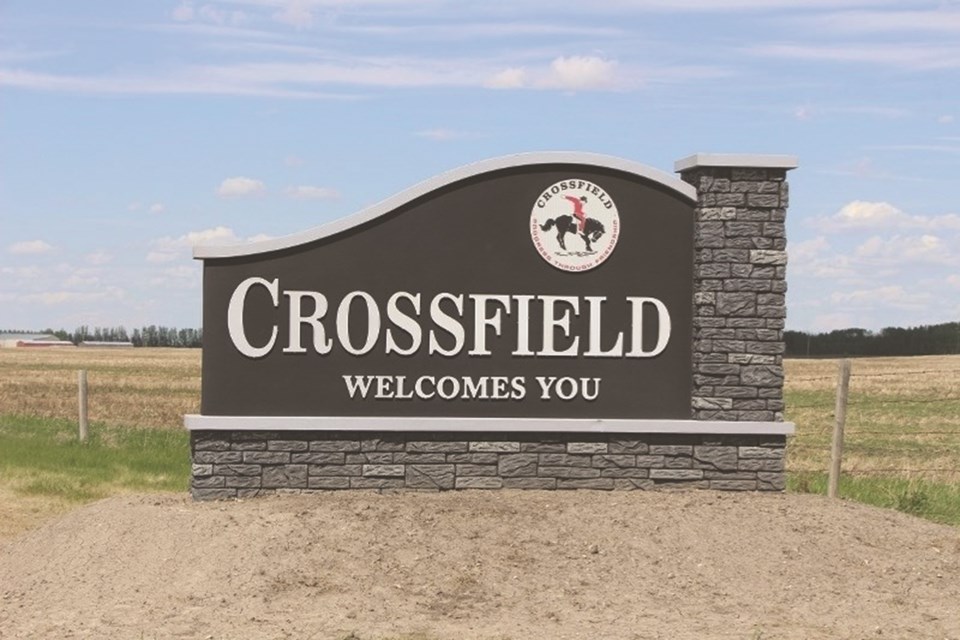Crossfield Town council has charted a course to solve the municipality’s issues surrounding wastewater treatment in the near future.
Council held a special meeting June 8 to deliberate on multiple components of the Town of Crossfield’s three-stage wastewater filtering system. Topics included the municipality's facultative (60-day) wastewater treatment cell, irrigation options for Crossfield's local golf course, a farmland irrigation pivot system, Crossfield’s effluent storage lagoon, and the need to develop a long-term wastewater treatment plan in the future.
“The facultative, 60-day treatment cell is over capacity and the effluent pond storage lagoon is nearing capacity,” said interim Chief Administrative Officer (CAO) Merrel Jarvis.
After an hour of staff presentations and questions, council approved a multi-part motion with costs of roughly $900,000. The motion included proceeding with aeration upgrades to the existing facultative cell and assessing an existing storage lagoon to confirm it can structurally handle a depth of three metres, which would increase the pond’s capacity by 80,000 cubic metres. The motion also approved the replacement of Crossfield’s aging farmland irrigation pivot system and the installation of a disinfection system from Sampson Water Services for the local golf course's irrigation purposes.
The motion also included the acknowledgement of the need for a future upgrade of the Town’s full treatment system, including primary, secondary and tertiary storage and treatment options.
“In the near term, this plan does not need to be too detailed, but we do need a long-term plan when it comes down to it,” said Mustafa Hashimi, the Town’s director of infrastructure.
According to the staff report included in the meeting agenda, the Town will pursue grant funding to help pay for the solutions outlined in the motion. The report stated there are three relevant grants available to apply for from higher levels of government.
The Town commissioned Allnorth Engineering for its 2016 Master Sanitary Plan, and a representative from the firm attended the June 8 council meeting virtually to discuss options to improve the capacity of Crossfield's 60-day treatment cell. Allnorth's recommendation was to create an aeration system for the existing 60-day cell to improve the treatment rate, which would be a sufficient solution for the next seven to 10 years.
“An aeration system would allow the utilization of the Town’s existing assets, which would result in a more cost-effective solution than constructing a new cell,” Hashimi said.
According to Hashimi, the construction of an aeration upgrade could begin next spring, pending the approval process from Alberta Environment and the securement of funding.
Regarding the Town’s farm irrigation pivot, Joe Holstein with Crossfield's water and wastewater operations said the pivot was installed in 1997, making it 24 years old. The Town-owned pivot, located south of the municipality’s effluent storage cell, was last used in 2005 and has an expected lifecycle of 20 to 30 years.
“With the pivot being installed in 1997 and having a lifecycle between 20 and 30 years depending on usage, it’s recommended action given the age of the farmland irrigation pivot system…to replace the entire system at a cost of $152,055,” Holstein said.
Another item discussed at the council meeting was the future of irrigation at Collicutt Siding Golf Course. Since 2019, the Town has participated in a pilot project to use technology supplied by Calgary-based company Swirltex, which builds custom wastewater treatment systems for municipalities, to provide a clean irrigation source for the golf course.
However, interim Chief Administrative Officer Merel Jarvis outlined another option to council, which would include installing a disinfection system supplied by Sampson Water Services. She said going with Swirltex’s technology full-time would cost the Town more than $650,000 plus annual operational costs, and would require the municipality to apply for a permanent regulatory permit beyond 2021.
According to Jarvis, the Sampson option would only cost about $47,100, though the company’s quote does not include ground work that would be completed by the municipality’s staff, including trenching and the construction of a shed to house the system. The cost of chemicals needed to operate the system – an annual cost of about $9,000 – was also not factored in.
Other than a lower price, Jarvis said a benefit of the Sampson system is that it would not require further approval, as it is already approved under the wastewater code of practice as a disinfection system for golf course irrigation.
While councillors had many questions about the presentation, they ultimately voted unanimously in favour of the multi-part motion.
Scott Strasser, AirdrieToday.com
Follow me on Twitter @scottstrasser19



